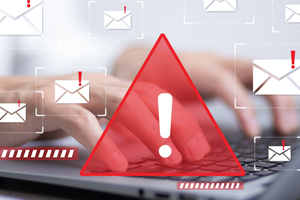Protecting your business from email scams
Business email compromise (BEC) scams are a cunning form of cybercrime where attackers impersonate trusted contacts to trick victims into sending money or sensitive information. These scams can cause significant financial losses and disrupt operations.
Here’s what you need to know to keep your business safe:
The deceptive disguise
Scammers often target employees with access to financial data or the authority to make payments. They might impersonate a CEO, vendor, or colleague, using tactics like:
- Spoofed email addresses: Email addresses with slightly altered spellings (e.g., [email protected] instead of [email protected]) can appear legitimate at first glance.
- Urgency and pressure: Emails may create a sense of urgency or pressure to act quickly, bypassing normal approval procedures.
- Familiar language and information: Scammers might gather personal details from social media or previous email exchanges to craft convincing messages.
Building a defense
There are several steps you can take to protect your business:
Educate employees: Train staff to identify red flags like urgency, sender inconsistencies, and requests for unusual actions. Encourage them to verify requests directly with the sender (via phone call using a known number) before taking any action.
- Implement strong security measures: Enforce strong password policies with multi-factor authentication (MFA) for all accounts. Keep software updated and regularly scan for malware.
- Scrutinize payment requests: Double-check any changes to payment instructions, especially for urgent requests or those involving new vendors. Establish clear protocols for verifying payment information.
- Be cautious with attachments and links: Never click on links or open attachments from suspicious emails.
By following these measures, you can significantly reduce the risk of falling victim to a BEC scam. Remember, a moment of vigilance can save your business from a costly attack.
Alpine Bank takes your digital security seriously, additional fraud and prevention resources can be found here.

